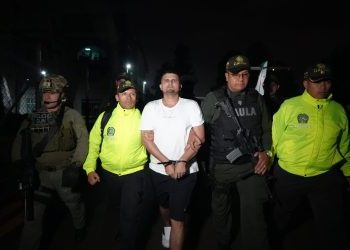Colombian authorities are struggling to disrupt extortion schemes run by imprisoned Venezuelan gang members, mounting a series of recent arrests but failing to prevent those incarcerated from continuing their criminal activities.
Police in Bogotá arrested 17 individuals linked to the Satanás gang, accused of extorting local residents, national media reported on January 12.
But they were far from the first arrests linked to the gang. Residents told local media outlets on January 4 that they were still being targeted for extortion by the group led by Venezuelan citizen José Manuel Vera, alias “Satanás,” despite the crime boss and at least 79 gang members being behind bars since last year. Many of those arrested were hit with additional charges for continuing to carry out extortion schemes from prison.
SEE ALSO: Extortion in Northern Triangle Worth Over $1 Billion Annually: Report
Satanás began operating in Bogotá in 2013, according to Colombian police. He was arrested in 2020 but escaped at the end of 2022 and began extorting residents in at least two sectors of Bogotá, before fleeing to Ecuador in early 2023. He continued leading his group from Ecuador, and had expanded operations to eight of the Colombian capital’s 20 sectors by the time Ecuadorian authorities arrested him in November 2023. He was extradited to Colombia that same month.
Criminal organizations across the region have converted prisons into de facto operations centers, including the Lobos and Tiguerones in Ecuador, the MS13 in Central America, and perhaps most famously, Tren de Aragua in Venezuela, which multiple sources have linked to Satanás’ gang.
InSight Crime Analysis
Given that the Satanás gang has proven it can operate effectively from within Colombian prisons, locking up more members is unlikely to curtail the group’s activities.
Due to a lack of oversight and corruption, Colombian prisons have frequently been used as extortion “call centers,” using smuggled cell phones to contact victims. Prisoners may demand payment from residents in the territories where the prisoner’s gang has a presence. But they often call numbers at random from a telephone directory and, posing as members of a criminal organization with a large nationwide presence, demand payment be sent to a specific account.
SEE ALSO: Venezuelan Extortion Gangs Exploiting Instagram to Amplify Threats
Despite wardens’ attempts to stamp out extortion by blocking cell phone signals at prisons in Colombia, many signal inhibitors are currently out of use. Some have been removed due to obsolescence, while others were removed due to court orders stemming from complaints from nearby residents whom the inhibitors had prevented from making calls. As long as Satanás members continue to access smuggled cell phones in prison, thanks mostly to corrupt guards, those locked up can help maintain the gang’s revenue stream.
Authorities elsewhere have faced similar difficulties in dealing with Venezuelan gangs managing their criminal activities from prison. Security concerns forced the relocation of Tren de Aragua members in Chilean prisons, and the Venezuelan gang the Gallegos has continued to extort residents in Lima, Peru, despite the arrests of dozens of its members.

